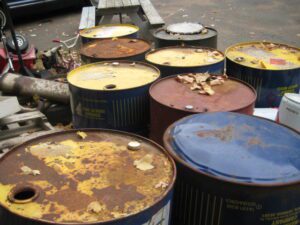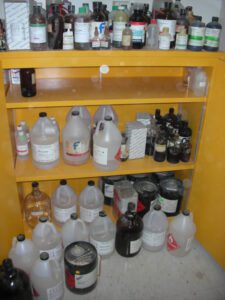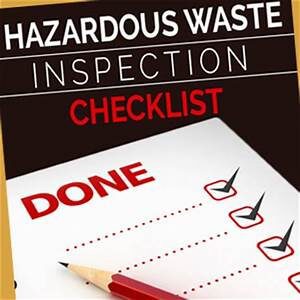
Below are 10 of the most common hazardous waste violations we see in facilities:
Open Containers

One of the most common violations and source of fines is for having open containers of hazardous waste. The regulations for this are very clear and state that containers of hazardous waste must be closed and latched at all times except when adding or removing waste.
No Hazardous Waste Manifests Records
To properly track your hazardous waste streams a uniform hazardous waste manifest must accompany hazardous waste that is shipped off-site. Failure to properly fill out your paperwork can lead to fines. To avoid violations you must also file and be able to produce manifest records when asked. Manifests must be on file for three years.
Improper Labeling of Hazardous Waste
Many hazardous waste generators fail to properly label tanks or containers that are used to store and accumulate hazardous waste onsite. Violations can occur in different ways, i.e. no label, improper information on the label, missing DOT placard labels, or wrong waste determination information.
Failure to Perform Hazardous Waste Determinations
When generators fail to properly identify all of the hazardous waste streams at their facilities, Infractions occur resulting in a violation. A hazardous waste determination will properly identify all properties and characteristics of the waste or waste product. Often analytical testing is required.
Improper Management of Expired Hazardous Waste

Lack of a Contingency Plan
A written Hazardous Waste Contingency Plan is a program designed to minimize hazards to human health and the environment from explosions, fires, an unplanned sudden release of hazardous waste, and other risks involved with the hazardous material. Failure to develop and notify the proper authorities is a violation of hazardous waste laws.
Infrequent Inspections of Hazardous Waste Storage Areas
Hazardous waste generators are required to perform a weekly inspection of all hazardous waste container storage areas. This is a common violation and one that is very easy to remedy by implementing standard procedures.
 Improper Disposal of Hazardous Waste
Improper Disposal of Hazardous Waste
Violations occur when companies either purposefully or mistakenly dispose of hazardous waste into dumpsters, general trash, or sewer systems by dumping waste down the drain.
Improper Management of Mercury
Recently the EPA has been cracking down on improper disposal of mercury-related products including assessing heavy fines for improper disposal. Mercury waste includes mercury-containing industrial wastes and also discarded mercury-containing products. Mercury is extremely toxic and spills are very expensive to clean up.
Inadequate or No Training for Employees in Hazardous Waste Management
Safety is a major concern in your facility, Protect your employees and the environment, know that hazardous waste management poses many risks. Employees that are improperly trained, do not have the knowledge about hazards or proper storage procedures and, in turn, can create hazardous conditions that endanger lives.
Don’t let your facility fail inspection for violations that can be easily managed with training. Be sure that employees who handle hazardous materials are trained in the hazards and have the correct knowledge needed to safely perform their duties. All ten of these violations can be avoided by having a competent person managing facilities waste and being trained in order to stay in compliance.

 Improper Disposal of Hazardous Waste
Improper Disposal of Hazardous Waste